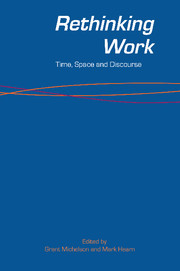PART III - DISCOURSE
Published online by Cambridge University Press: 05 June 2012
Summary
The relationship between time, space and discourse flows from their common source as expressions of our value constructions, expressed in the metaphorical distribution of time and space and our construction of discourse. Our metaphors are our lives written into meaning, validating or challenging our chosen forms of behaviour and organisation. Discourse analysis and narrative theory have evolved from various influences to uncover the values encoded in speech and document, from Barthes' structural analysis to Ricoeur's focus on the relationships between time, narrative and identity (see Ricoeur 1992; Barthes 2000). In the analysis of work discourse, Foucault's stress on the operation of power, and its elaboration in discursive formations, has proved enduring (Foucault 2003). Following Foucault, McKenna has recently asserted that Critical Discourse Analysis seeks to uncover the relationship between discourse, power, dominance and social equality, and must rededicate itself to this politicised enquiry, with work as a key site of struggle. ‘Given the neo-liberal ascendancy, the consumer-identity culture … and brutal economic displacements, the issues of identity, agency, social fragmentation and the workplace must be an important focus of study’ (McKenna 2004: 10–11, 21). The chapters in this section reflect a commitment to that aim, the force of the analysis driven not only by theory but by the experience of men and women in work and the influence exerted by the narratives that structure work, management strategy and ethics.
- Type
- Chapter
- Information
- Rethinking WorkTime, Space and Discourse, pp. 211 - 214Publisher: Cambridge University PressPrint publication year: 2006

